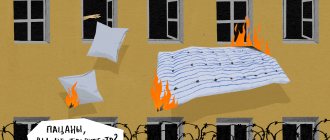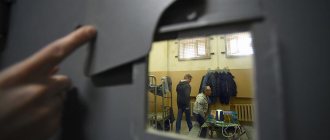Prisons and colonies are not the best places for former police officers and other security officials. Criminals, for obvious reasons, dislike them, which means, regardless of the article of accusation, the fate of former employees in the zone is unenviable. In a previous article, Lenta.ru published a story by a Drug Control operative about some of the features of his work, in particular, about infiltration into criminal groups. In the second part we will talk about how an opera’s life develops if he himself becomes a convict, and getting used to the criminal environment ceases to be work and becomes a vital necessity. A former criminal investigation operative who ended up behind bars told Lenta.ru about this.
“Epaulettes, ranks and titles in the zone are unimportant”
I worked in the criminal investigation department until 2013. For a long time - in cases of extremism, and then - in the department for combating robberies. It all ended quite sadly: at that time the system was changing - the police became the police, and the ranks began to be purged. A criminal case was opened, and I found myself on the other side of the barricade.
Former law enforcement and security officials are kept separate from other prisoners. For them there are both general and strict regime colonies. We are often told: if only you and everyone else could sit there. But, firstly, we are taken for walks and investigative activities, where we all intersect, and secondly, there are prison hospitals or departments at pre-trial detention centers, where in general everyone is in the general mass, and there is no difference, police officer (b/ s - former employee) whether you are or not.
When I was being taken to court, a confrontation occurred. We were unloaded, one asked me: cop? And it began: you’re crazy, your colleague shut me down... I tell him: contact him. Well, they clashed, the administration intervened.
And in the hospital where I spent a year while I was under investigation, I sat with thieves, murderers, and rapists. People are different, and so is their attitude. There were also conflicts. Once a prisoner sat at the same table with me - he was later not allowed into the hospital ward because he was sitting with a cop. There are also such urkovsky ["urka" in prison slang - thief, bandit] concepts, but in fact there is not so much of this in the zone.
What is important here is not so much who you are by profession and what article you are under, but what kind of person you are and how you position yourself
Even the fighters in the zone are very different. These are former police officers, prosecutors, lawyers, internal troops, border guards and even ordinary drug addicts who simply served in the special forces long ago, but still ended up in a colony for former employees.
There are those who have nine classes of education and several degrees, and there are those who have several higher degrees. It could be an investigator, a dodik with glasses, or it could be a big-time police officer who spent his whole life chasing drunkards around the corners. Of course, the latter will dominate in camera conditions. Shoulder straps, ranks and ranks do not affect the distribution among cells and the prison hierarchy in any way; the zone - no matter whether it is non-class or simple - represents the entire cross-section of society.
Among the security forces there are those who are going crazy: they beat tattoos, they speak slang, they share the thieves’ ideology. There are those who behave like a cop: bending their fingers, brazenly declaring: I served, I imprisoned you such freaks. No one will tolerate this; it will be stopped immediately. Even with your own.
Everyone understands that they are in the same position.
Photo: Denis Gukov / RIA Novosti
I was lucky, I was never bullied, but the “grandfathers” were sitting with me. These are people who have served 20-30 years in prison, and in this regard they are the worst category - they have nothing to lose.
They will calmly come up and quietly stick a sharpener into you
It is clear that there are knives and sharpening tools in the zone. And it's scary.
Authority helps a lot here. I worked for authority for a long time. Helped someone, worked as a nurse. Once, with our own money, we bought a lens for one “grandfather” in the prison hospital. He was transferred to St. Petersburg from Krasnodar for surgery. It’s a two-month journey, and it’s just torture: the journey itself, a bunch of transit isolation cells - they arrive exhausted, with lice, and he’s also blind.
There was no lens at the hospital. This means that he needs to be sent back, and then, when the lens appears, discharged here again. My friends and I agreed, chipped in a couple thousand each and bought a crystal with our own money through relatives.
He helped someone by passing on food or cigarettes. We communicated in the pre-trial detention center through the ventilation - you stand on the toilet and scream or “let the horse in” [a method of passing prohibited items from cell to cell]. This was completely wild for me as an employee: you stick a stick through the window, and from another chamber they release a long thread with a load and unwind it until it catches on the stick, then both ends are connected - and you get the “road” along which I sent others socks with cigarettes and cookies.
One day I myself got a “horse” - at three o’clock in the morning a phone came to me in my sock, and I was finally able to call home.
“The golden rule is to be responsible for your words”
There are a lot of videos on the Internet where young aueshniks [supporters of the AUE movement - the prison way of life is one] try to show off to the employees, to live according to some thieves’ concepts, and in the next frame they sit: “I apologize to the employees, that’s not what I meant...” .
It seems to me that we have stopped being held accountable for words. Such people really need to sit down, because the zone will quickly retrain. The golden rule there is to be responsible for your words.
Promised - must do, insulted - must hit, even if the opponent is strong and powerful
You should not impose [impose] your point of view, but you should not allow vain lies either. I had a story when a former military man began to overwrite [convince] that he had medals, but I had medals. I asked: “What’s the difference? A medal is recognition. The military man fulfilled his official duty and received an award - the same with me.” I was proud of my medal, I walked towards it. It's still my pride, so I couldn't let him say that. Here you need to respect yourself first.
They won't charge you for your article, but they may charge you for the way you behave. If you do the wrong thing, you may fall into a place from which you can no longer rise.
A man once came to my cell with a letter from authoritative people - they say, don’t touch him, he’s normal. Well, I read it and thought: what nonsense... I asked him what the matter was. It turned out - pedophilia, and in relation to his own eight-year-old daughter: he filmed her naked and posted photos on the Internet. He himself says that he was set up - he only committed a burglary.
We tolerated it for a day, but then we realized that it was not. I don’t know if this is by convention or not, but the next day I took his backpack, knocked on the cell door and threw him into the passage. Told him to come out. Then it turned out that he had been convicted before. I’m still used to not making mistakes in people.
Photo: Dmitry Korotaev / Kommersant
We also had “offended” people in the hospital - they stroked us and cleaned us up. These are very different people. One lived with a prostitute in the wild, the other was made “offended” by the administration. Previously, in the zone there was a ritual of lowering oneself - pissing. This man was in denial [prison slang for a prisoner who does not recognize the authority of the institution’s administration], if you look at him, he is a typical prisoner, even with “epaulettes” [tattoos on his shoulders]. There was a riot in their colony, he killed an employee, and the administration took revenge. They carried out this action through their activists, and they lowered him. And so, from the thieves' point of view, he knocked out the cop - that means respect, but it turned out completely differently.
There was a man who was imprisoned for about 20 years. Somehow it turned out that he took a can of canned food from the “offended” person, but you can’t touch their things. He was asked to leave, and a council was called whether to consider him a bad person or not. While they were sorting it out, he lived in the corridor. Although he’s also an ordinary guy, a prisoner.
Cock corner
And in general, in order to move to another zone, even if the regime there is more strict, the prisoners who have “messed up” try to commit some kind of crime. They can demonstratively beat someone in front of everyone. If they don’t want to kill or maim as punishment for a “jamb,” but “put them down,” then many prisoners themselves take their belongings and voluntarily go to the “cock’s corner.”
As an employee of one of the colonies said, there was such a case: “They decided to let go of a convict who stole from his own people, that is, a “rat.” And do this not humanely, but as expected, in the sense of “piercing.” And even in a group manner, so to speak. But the “rat” prisoner, who knew perfectly well what awaited him, himself asked to go to the barracks for the “offended.” After that, no one began to rape him - he was “finished” and now he’s a “rooster”. But the concept of a zone does not allow him to be forced into being a “working rooster.”
In addition, if there is a danger to life, some convicts seek protection from the administration. She, as a rule, goes to meet them halfway (why do they need an emergency in the form of a corpse in their patrimony?) and takes them under her “roof”. How this process happens, I was told by the “godfather” (that is, the deputy head of security and operational work) of one of the St. Petersburg zones: “As a rule, the “shoals” after which they ask us for protection are a gambling debt or a debt for buying drugs in "credit". It happens that huge sums accumulate by any standards. Indeed, the danger for such convicts in this case is very great and we are taking measures. I or my assistants communicate with convicts who want to deal with the debtor. We warn them that if anything happens, we will deal harshly with them and they will get a new sentence, no matter what. This kind of conversation almost always helps.”
“When you sit for a long time, you try to create a semblance of comfort around you.”
There are many methods of influencing prisoners. I didn't think about this before. And I’m not even talking about physical violence - it has decreased in recent years. The employees understand that every morning there is a roll call - everyone comes out bare-chested. If there is someone beaten, there will be a trial, because lawyers come and people are taken to court. Today he will screw the prisoner, and tomorrow, for example, he must be taken to the investigator. A FSIN employee cannot always guess when and what will happen.
It is safer, but just as effective, to apply psychological pressure. Create bad or good conditions. You may have a small cell with bad windows, it may be cold, drafty, damp, or it may be bright and warm.
Photo: Grigory Sysoev / RIA Novosti
I was under investigation for a year and eight months. You have to understand that when you sit for so long, you try to create a semblance of comfort around you, your own microcosm - in one pre-trial detention center we even made repairs to the cell - we painted the walls and ceiling, fixed the plumbing. There, all the little things become important, even a stainless steel spoon instead of an aluminum one. And once I went on an investigation and brought with me a pack of dumplings - you should have seen the face of the young guy from our cell when we cooked them and ate them all together.
And just imagine: you have arranged everything, become close and friendly with those around you, you already have a mini-family - it’s not for nothing that the cell is called “family man”. You distribute responsibilities - who cleans, who washes the dishes, who does what else, you have drawn up a schedule with assignments.
We learned how to cook soup in a plastic container with a boiler and make hot sandwiches in a bag. All these simple things bring you closer to will
And then you are transferred to another cell or another pre-trial detention center.
I was given a lot of rides for being intractable - I refused to sign an empty protocol, and in the winter I was sent to Kresty for my birthday. If you want to smell prisons, this is the best place. Shower for ten minutes a week, it’s hot in the summer, and you sleep in a hat in the winter, the cell is six square meters for four.
Every two days they took me out for a run and looked for my phone. It was a kind of press hut. Those who were sitting with me did not exert any influence, but the employees clearly set the task of ruining our conditions: they ripped up pillows and mattresses, assuring everyone that I had a phone, they harassed us - and so on three times a week.
The guys have already said: “Listen, we understand that now they are trying to break you like this, but everything was set up for us.” As a result, I was transferred to another cell, and then to a special unit. So I rode from cell to cell and to different pre-trial detention centers.
Much depends on who is in the cell with you. It can be compared to a compartment on a train. The whole journey depends on what kind of travel companion you have.
If you’re lucky, you’ll spend your time usefully, it will fly by like an hour, but if you’re not, you’ll suffer and count the hours.
Bad luck is not necessarily an aggressive neighbor, it can just be a vegetable. For example, prisoners have an hour of exercise: some run in circles, some do push-ups, some do pull-ups, and some just lie there like a seal all day. With a shower - one of them agrees to wash himself every day or comes up with something like a shower in the cell - we organized basins and watering cans, but the other doesn’t wash for two or three weeks - he doesn’t care. They put such a vegetable in front of you - everything, there is tension in the cell, even the air is stale.
"Anyone could be here"
I won’t say that after all this I was angry or somehow disappointed in the system. I still love my job as a criminal investigator. Although they say that the police are no longer the same - they protect public order instead of dealing with crimes, but it was still cool and interesting to work.
And after life with crusts [service ID], when I was almost the king of life, there was a sharp change: first prison life with its rules, and then life after it, when you not only have no privileges, but are also flawed . My criminal record has already been expunged, but no one cares. Looking for a job, they ask you: were you hired? Yes. Bye then. Or they ask, looking at your resume: what did you do during these three years? I say that I was under investigation, without going into details, but, as a rule, this is enough. Everyone cares about the lantern, for which he was sitting.
This is a serious school of life that I keep trying to forget. My attitude towards prisoners has not changed - I communicated with them all my life, understood and knew their nature. But to the FSIN system - yes.
Over these three years, I realized that in prison you can do anything to a person: break him, intimidate him with the hands of prisoners - elementary
And I was also convinced that everyone is in Russia - drug addicts, heads of financial corporations, employees, military personnel - everyone. Anyone can end up here with a little money. I don’t like the wording “in our country” - it’s probably everywhere except for plush countries like Norway, but here, if you start being too principled about going where you shouldn’t, you can get hit in the ass very hard.
Therefore, I do not blame those who turned their backs on me then - they were also afraid to run into the locomotive. Everyone chooses for themselves. It’s not for nothing that they say: a friend is a friend in need. It was a shame though. When I was in a pre-trial detention center and my guilt was not even proven, the management came to me in the detention center and informed me of my dismissal with the wording “for an offense discrediting the honor and dignity of an employee.” At the same time, many sat and were not fired. It jarred. It turns out that the presumption of innocence does not work for us. It’s good that they didn’t fire me retroactively.
I can't say that the problem is solely in the system. This is society too. How many administrative offenses do you commit per month? I think that's enough. Every time before crossing, I force myself to stand on a red light - it is always long, and the road is always empty. People pass by, and I stand and realize the stupidity of the situation.
Our level of legal awareness is minimal. But administration is also an article. We should probably start with ourselves, and remain human. There are also people coming out of prison from whom you won’t hear swear words, who won’t let you down and know how to answer for their words.
Coronation
The tradition of “coronation” comes from a period when thieves, in order to raise their own authority, spread stories about the origin of the thieves’ caste from the robber atamans who belonged to the nobility, writes ugolovnyi-expert.com. The coronation procedure itself to become a thief in law is not very well known - the underworld community is one of the most closed communities.
Jail. Camera. Lattice
CC0



